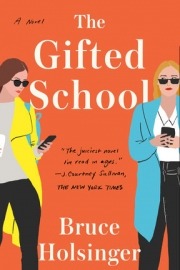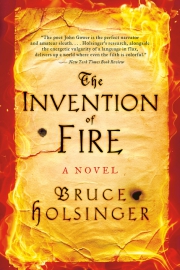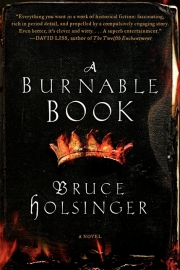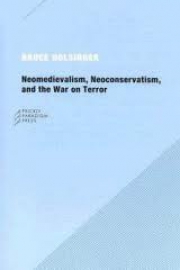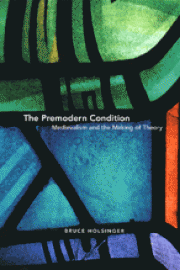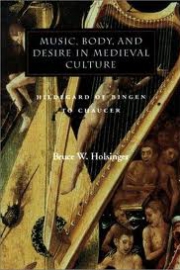
Bruce Holsinger
Linden Kent Memorial Professor of English; Editor, New Literary History
406 Bryan Hall
Specialties:
Critical Theory, Medieval
Biography
Bruce Holsinger specializes in the literature and culture of the medieval world, with additional interests in historical fiction, modern and contemporary theory, the history of the book, and premodern religious cultures. His new book, The Parchment Inheritance: Animals, Archives, and the Making of Culture from Herodotus to the Digital Age (forthcoming from Yale University Press in 2022), explores the parchment record of the premodern world from a number of different angles: environmental history, theology, historical genetics, and so on. His research for this project has involved extensive collaboration with an international team of bioarchaeologists, conservators, and other scholars in the emerging field of "biocodicology": the biomolecular analysis of written objects, particularly parchment. His previous books, including The Premodern Condition: Medievalism and the Making of Theory as well as Neomedievalism, Neoconservatism, and the War on Terror, have explored the shaping role of the medieval in the making of modern critical thought and political discourse. His first book, Music, Body, and Desire in Medieval Culture: Hildegard of Bingen to Chaucer, won the Modern Language Association Prize for a First Book, the John Nicholas Brown Prize from the Medieval Academy of America, and the Philip Brett Award from the American Musicological Society.
Holsinger is also a fiction writer. His novel A Burnable Book (HarperCollins/William Morrow 2014) won the John Hurt Fisher Prize, was selected as an Editor's Choice by the New York Times Book Review, and was named one of the top crime novels of 2014 by the American Library Association. The Invention of Fire (HarperCollins/William Morrow 2015) explores the beginnings of gun violence in the Western world. Both novels have been widely reviewed in publications such as The New York Times, The Washington Post, and the Sunday Times of London, and his fiction writing has been featured several times on National Public Radio. His third novel, The Gifted School (Penguin Random House/Riverhead, 2019), won the Colorado Book Award. His next novel, The Displacements, will appear in 2022.
Degrees
Ph.D. Columbia, 1996
M.A. Minnesota, 1992
B.A. and B.Mus.A. Michigan , 1989
M.A. Minnesota, 1992
B.A. and B.Mus.A. Michigan , 1989
Books
- The Gifted School, Penguin Random House/Riverhead, 2019
- The Invention of Fire, HarperCollins/William Morrow, 2015
(historical novel) - A Burnable Book, HarperCollins/William Morrow, 2014
(historical novel) - Neomedievalism, Neoconservatism, and the War on Terror, Prickly Paradigm Press: Chicago, 2007
- The Premodern Condition, University of Chicago Press, 2005
- Music, Body, and Desire in Medieval Culture, Stanford University Press, 2001
Articles
- Sarah Fiddyment, Bruce Holsinger, Chiara Ruzzier, Alexander Devine, Annelise Binois, Umberto Albarella, Roman Fischer, Emma Nichols, Antoinette Curtis, Edward Cheese, Matthew D. Teasdale, Caroline Checkley-Scott, Stephen J. Milner, Kathryn M. Rudy, Eric J. Johnson, Jiří Vnouček, Mary Garrison, Simon McGrory, Daniel G. Bradley, and Matthew J. Collins, "Animal origin of 13th-century uterine vellum revealed using noninvasive peptide fingerprinting." Proceedings of the National Academy of Sciences 112 (49): 15066-15071.
- "Object-Oriented Mythography," forthcoming in Minnesota Review (2013)
- "'Historical Context' in Historical Context: Surface, Depth, and the Making of the Text," New Literary History 42 (2011)
- "Parchment Ethics: A statement of more than modest concern," New Medieval Literatures 12 (2010)
- "Medievalization Theory: From Tocqueville to the Cold War," American Literary History 22 (2010)
- "Of Pigs and Parchment: Medieval Studies and the Coming of the Animal," PMLA 124 (2009)
- "Empire, Apocalypse, and the 9/11 Premodern," Critical Inquiry 34; reprinted in Andrew Cole and D. Vance Smith, eds., The Legitimacy of the Middle Ages: On the Unwritten History of Theory (Duke UP, 2010).
- “Liturgy.” 21st-Century Approaches to Literature: Middle English. Ed. Paul Strohm. Oxford: Oxford University Press (2007).
- “The Parable of Caedmon’s Hymn: Liturgical Invention and Literary Tradition.” Journal of English and Germanic Philology 106 (2007).
- “Lyric Inventions: The Short Poems,” in The Yale Companion to Chaucer, ed. Seth Lerer (2005).
- “Lollard Ekphrasis: Situated Aesthetics and Literary History,” in Journal of Medieval and Early Modern Studies (2004).
- “Medieval Literature and Cultures of Performance,” in New Medieval Literatures (2003).
- “Medieval Studies, Postcolonial Studies, and the Genealogies of Critique,” in Speculum (2002).
- “Vernacular Legality: The English Jurisdictions of The Owl and the Nightingale,” in The Letter of the Law: Legal Practice and Literary Production in Medieval England, ed. Emily Steiner and Candace Barrington (Cornell, 2002).
- “Ovidian Homoerotics in Twelfth-Century Paris: The Letters of Leoninus, Poet and Polyphone,” in Gay and Lesbian Quarterly (2002), co-authored with David Townsend.
- “The Ovidian Verse‑Epistles of Master Leoninus,” in Journal of Medieval Latin (2000), co-authored with David Townsend.
- “Langland’s Musical Reader: Liturgy, Law, and the Constraints of Performance,” in Studies in the Age of Chaucer (1999).
- “The Vision of Music in a Lollard Florilegium: Cantus in the Middle English Rosarium Theologie ( Cambridge, Gonville and Caius College MS 354/581),” in Plainsong and Medieval Music (1999).
- “The Color of Salvation: Desire, Death, and the Second Crusade in Bernard of Clairvaux's Sermons on the Song of Songs,” in The Tongue of the Fathers: Gender and Ideology in Twelfth-Century Latin, ed. David Townsend and Andrew Taylor (Penn, 1998).
- “Sodomy and Resurrection: The Homoerotic Subject of the Divine Comedy,” in Premodern Sexualities, ed. Louise Fradenburg and Carla Freccero (Routledge, 1996).
Book Reviews
- Review of L.O. Aranye Fradenburg, Sacrifice Your Love: Historicism, Psychoanalysis, Chaucer (Minnesota, 2003), Studies in the Age of Chaucer 27 (2005).
- Review of Patricia Ingham, Sovereign Fantasies: Arthurian Romance and the Making of Britain (Pennsylvania, 2001), MLQ 66 (2005): 119-24.
- Review of David Matthews, The Invention of Middle English: An Anthology of Primary Sources (Penn State, 2000), Speculum 77 (2002).
- Review of Barbara Newman, ed., Voice of the Living Light: Hildegard of Bingen and Her World (California, 1998), Journal of Religion 81 (2001): 351-53.
- Review of J. Stephen Russell, Chaucer and the Trivium: The Mindsong of the Canterbury Tales (Florida, 1999), Studies in the Age of Chaucer 22 (2000): 531-34.
Honors
- John Nicholas Brown Prize from the Medieval Academy of America, 2005
- MLA Prize for a First Book, 2002
- Philip Brett Award from the American Musicological Society, 2001
- John Simon Guggenheim Memorial Foundation Fellowship, 2004
- Frederick Burkhardt Fellowship, American Council of Learned Societies, 2004-2005
- National Endowment for the Humanities Fellowship, 2000-2001
- Visiting Professor, Center for Medieval and Renaissance Studies, UCLA, Nov. 1999
- Javits Fellowship, 1993-1996

